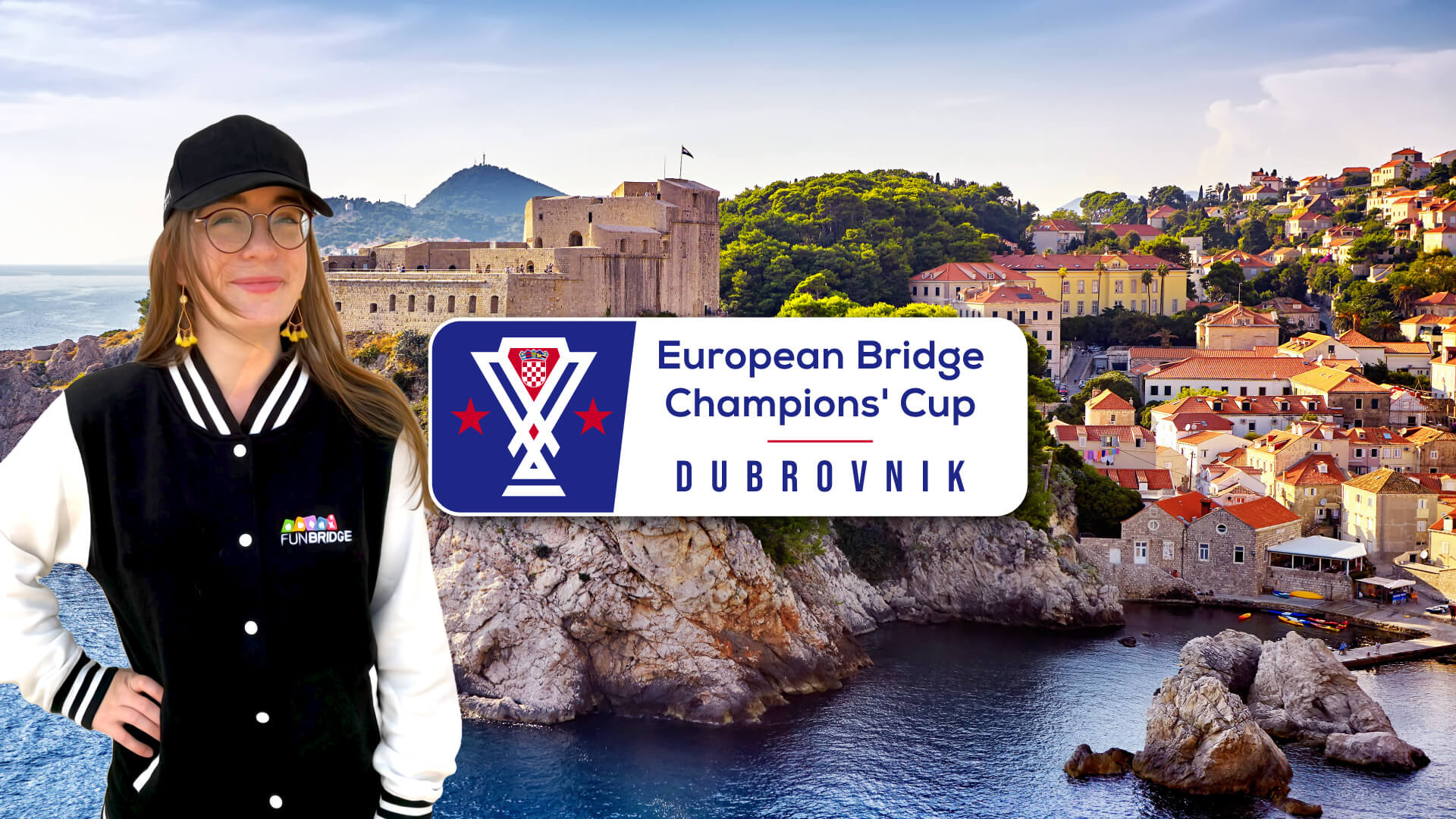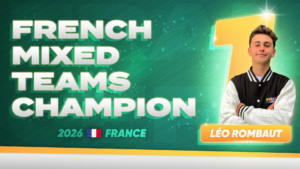
Champions’ Cup Dubrovnik 2023: Bridge, Sea and Gold

The 21st edition of the Champions’ Cup and the 1st edition of the Women Champions’ Cup (organised by the EBL) took place in Dubrovnik, Croatia, from Thursday 9 November 2023 to Saturday 11 November 2023.
Having had the chance to participate, I am happy to share my first experience of playing a Women Champions’ Cup with you. This is an international event that brings together the national champions of the top 8 countries of the previous European Team Championships.
And that is how, in France, the winners of the first national division (DN1) women’s team competition were called to defend the country’s colours in Croatia.

Among the holders of the title, only Anne-Laure Tartarin, Carole Puillet, Valérie Sauvage and Sabine Rolland went to Croatia. They invited me and my partner Anaïs Leleu to be part of their team, for which we are very grateful.

Five of us left for Dubrovnik on Wednesday 8 November as our team captain Carole Puillet was already there waiting for us.
The 7 participating teams in the Women Championship played a “round robin” (each team plays 1 match against every other team) consisting of 7 rounds of 14 deals each (including one “bye” round because the Israeli team had to withdraw a few days before).
Participating countries were Croatia as host country, Sweden, Germany, Poland, Turkey, Denmark and France.


Two days of round robin
The playing room was common to both championships. At the table, we played with screens, using tablets only for the bidding. Thus, there was no bidding tray like there is in high-level competitions in France. But we did have real cards in our hands throughout the deal, to the delight of the whole team.
First match against Denmark: we were at the table of Ella Rosthoej and Julie Marina Sigsgaard, whom I met this summer in the Netherlands at the World Junior Championships where I competed in the U26 Women Teams.

We lost this first match by 44 IMPs and scored only 1.5 out of the 20 shared victory points, but I am still going to tell you about our only successful coup of the match:

All vulnerable. Dealer West.
East opens 1♠, her partner responds 2♦, game forcing, and I bid 3♣ with the North hand. In this situation, with the opponents known to have the point majority, 3♣ does not show points but a good suit with at least six cards.
Over my 3♣, East bids 4♣. This is a Splinter, agreeing diamonds as trumps. The bid shows that she would like to play in slam and promises at least 4 diamonds.
Anaïs as South makes a 5♣ pre-empt, preventing the opponents from asking for key cards or describing their hands further. West bids 6♦ without hesitation, and Anaïs goes on to 7♣.
West passed: this is a forcing pass. It is used at high levels in the auction when your side obviously has more points than the other but it is unclear whether you should double the opponents or bid on. East preferred to double and we managed to get out with 7♣ doubled 4 down, 1100 for them, which was good defence against the slam that our opponents were going to play (6♦ +1 = 1390).
Meanwhile at the other table, Sabine’s and Valérie’s auction was a lot faster and they were the only ones to find the grand slam among the six women’s tables:

+2140 after the hearts go away on East’s spades, which allowed us to win 14 IMPs.

Fortunately, the other matches of the day went better, with +30 IMPs against Sweden and +37 IMPs against Croatia.
We had our “bye” in the last match, and this free time allowed us to enjoy the only sunny day of our stay in Dubrovnik with the whole team.
We walked along the Adriatic Sea to reach the Old Town, where we could see the city gates, the Onofrio fountain, the main street Stradun, the cathedral…




Valerie, Sabine, Anne-Laure and Carole had decided to take an extra day to enjoy the city. This gave them time to climb the ramparts, from where you can admire all of Dubrovnik.


On the second day, we faced Turkey against whom we lost by 19 IMPs. Then we lost by 6 IMPs in our match vs Poland, against whom we had the occasion to use a rare convention.
All vulnerable. Dealer East.

West opens 1♣ in third position and as North, I find myself with 6 clubs and 4 hearts. I overcall with 2♣, which shows a 6-card suit and at least ten points. Over 2♣, it is not possible to cue-bid opener’s suit in order to ask for more information about the partner’s hand, 3♣ simply showing a fit in a positive hand. We therefore use 2♦ as artificial relay to ask the overcaller to show a possible 4-card major or to bid No-Trumps or repeat her suit instead.
That was the full auction:




We finished the last match of the qualifiers with a 7-IMP defeat against the Germans who finished first of the round robin with a lead of one and a half match!
This put us in third place, behind Turkey and ahead of Denmark. For the semi-finals that are played in two segments of 16 deals, the team placed first (Germany) chooses who they prefer to play against, between Denmark and us. We were quite happy not to be chosen!
Semi-finals, France vs Turkey and Germany vs Denmark
To everyone’s surprise, the German ladies who had largely dominated the round robin lost their match against Denmark by 12 IMPs.
As for us, playing against Turkey worked better this time than during the qualifying match. We won with a score of 86 to 23 IMPs.


At the end of each match, we debrief together before motivating each other for the next one!
Final, France vs Denmark
While we played for the Cup against Denmark, Germany played against Turkey for the bronze medal.
The final was also played in two segments of 16 deals. In the first one, we found ourselves again at the table of Ella and Julie who were just as delighted as us to be in the final! The atmosphere was very relaxed and we started with a 17-IMP win in the first segment.
Here is a deal that I played where the declarer play is of interest (contract made at 3 of the 4 tables):

Start with Stayman with 8 points to show an extremely weak hand over 2♦. If partner responds 2♠, you will have to bid 2NT and partner must think of bidding 3♥ if he has a maximum hand and a 3-card fit.

I thus have to do my best to get 10 tricks in my heart contract on a trump lead from North. I see that I will have to lead towards my kings, but which one should I start with?
The trump lead suggests that North is more likely to hold the aces than South (the reason why she did not want to lead one of the suits). Therefore, I started with three rounds of trumps followed by a diamond to the king which held. First good news! I then ducked a diamond trick. North gets on lead when South does not go up with the queen.
She now finds the best defence and exits with a diamond. I ruff in dummy and play a spade towards my king. It loses to the ace and North plays back a spade to her partner’s queen. Now, South is forced to either open up the club suit or give me a ruff and discard, which is the best play: I can indeed discard a club and ruff in the other hand, but I still have a club loser left in case the suit breaks 3-2 with split honours.
This is what happens at the table and I now have to decide how I will try not to lose a club trick (I already lost two spades and a diamond).
The possibilities are as follows, with A94 facing K1076: either cash the ace and king, hoping to drop Queen-Jack doubleton or win with a stiff honour and then finesse against the other one (possible in both directions).
Finding QJ doubleton is very unlikely, and there is another element to consider: North did not lead a club, so she is unlikely to hold QJ doubleton or three small cards. Also, if she had a singleton, she probably would have led it.
I therefore decide to cash the king from my hand and when South follows with the jack, I decide to play with the odds (theory of restricted choice: it is twice as likely that North had Qxxx than South QJ) and successfully finesse against the queen.
The full layout:

At the end of the second segment, which we finished before our team mates at the other table, we were completely stressed out over the last deals: we lost exactly what we had won in the first segment and I played very badly, not yet knowing how to manage the pressure well. We lost the second segment by exactly 17 IMPs, putting us in a tie with the Danish ladies!
The regulation stipulates that in the event of a tie, it is the order in which we finished in the qualification phase that applies: as we finished third, just ahead of them, we won the gold medal by exactly 0 IMPs!

The Germans unsurprisingly won the bronze medal, and the EBL members gave a very encouraging speech about the future of women’s bridge: this time, 8 teams were invited, but it will be 10 next year, and 12 the year after.
A Champions’ Cup that I will remember for a long time: my first experience in a great women’s national team, this extraordinary draw at the end of the final, and a superb gold medal for the first edition!


What do you think of this article by Margaux Kurek-Beaulieu ?
Share your opinion in the Comments section below!




Wonderful photos and lovely write-up with well chosen hands. Congratulations on your win!
Thanks you !!
Great information and congratulations to you all. Nice to be informed in a good article.
Thanks it’s really nice